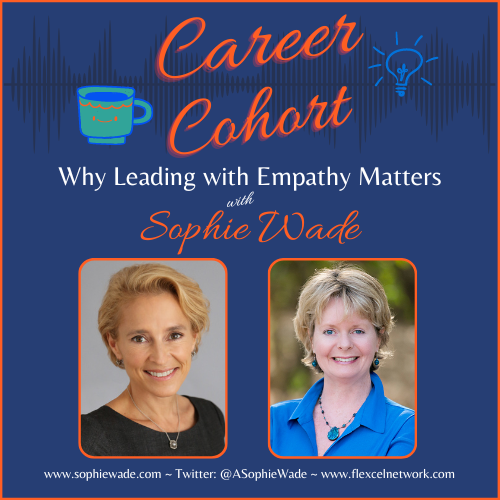
“The future of work has arrived, and it’s powered by empathy. We need to orient ourselves differently to be successful, shifting from transactional to human-centric management, mindsets, and methods to deal with the faster pace of business developments, continuing uncertainties, more complex issues, and an increase in multidimensional projects.”—𝐒𝐨𝐩𝐡𝐢𝐞 𝐖𝐚𝐝𝐞, 𝐚𝐮𝐭𝐡𝐨𝐫 𝐨𝐟 𝑬𝒎𝒑𝒂𝒕𝒉𝒚 𝑾𝒐𝒓𝒌𝒔
I had a great conversation with Sophie Wade about why we need to cultivate empathy in the workplace, specifically if we hope to unleash the power of Gen Z.
…and it’s not just so they can coach us on the latest tech tools…
HIGHLIGHTS of our conversation…
🌟 Bidirectional mentoring is the foundation for bridging gaps and fostering greater understanding between generations—because mutual understanding is what ultimately cultivates mutual respect.
🌟 The meaning of *lifelong employment* and *hard work* are just two examples of phrases that can hold very different meanings depending on the person—especially across generations. We can no longer take for granted that traditional workforce ideas hold the same meaning from one person to another. Let’s dig in and have more direct cross-generational conversations to uncover (and acknowledge!) the differences.
🌟 It’s time to accept that younger employees will likely leave sooner for new opportunities, even if we invest in their development. The upside? Our connections with those employees don’t have to end when they leave, and they can serve as valuable ambassadors for our companies (and for us as individuals!)—if we’ve helped nurture their careers.
🌟 Interns are a great resource and are often eager to contribute. Harnessing that energy with an intentional integration plan so they’ll feel a commitment to our company is a worthwhile investment.
🌟 Building trust early and when things are going 𝑠𝑚𝑜𝑜𝑡ℎ𝑙𝑦 will prepare our team for when a crisis hits. Studies show that oxytocin is needed to help generate trust. Studies 𝑎𝑙𝑠𝑜 show that stress is an inhibitor of oxytocin. So mid-crisis isn’t the time to expect teams to quickly come together to meet our challenges if we haven’t laid the groundwork.
Sophie’s latest book, Empathy Works, provides essential insights and knowledge to adapt, thrive, and grow―no matter what the future holds―and is an invaluable resource for both established and rising leaders and professionals in any field.
Sophie is a work futurist, international keynote speaker, and an authority on future-of-work issues. She is the host of the widely popular Transforming Work podcast and over 450,000 learners have taken her four LinkedIn courses which cover empathy, future-of-work skills, and gen Z.
She’s the Founder and Workforce Innovation Specialist at Flexcel Network, a Future-of-Work consultancy. Sophie’s executive advisory work and transformative workshops help companies adapt and update their work environments and attract, engage, and retain their multigenerational and distributed talent. She helps corporations maximize the benefits and minimize the disruption in their transition to talent-focused, digitalized work environments.
You can learn more about Sophie and her new book, Empathy Works: The Key to Competitive Advantage in the New Era of Work, at www.sophiewade.com and connect with her on LinkedIn and Twitter @ASophieWade. You can also learn more about her at her company website.